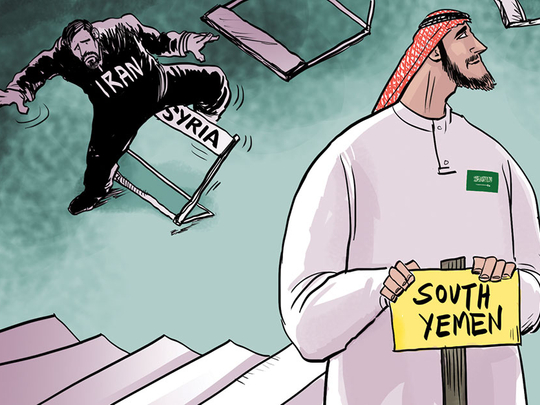
The regional geopolitical balance of power is titling towards the Riyadh-led forces of stability rather than the Tehran-led forces of instability. Saudi Arabia seems to have scored a couple of unexpected points lately. Traditionally, any win by Riyadh automatically translates as a net loss for Tehran.
Saudi Arabia is looking decisive and gaining more political and even military ground in places like Yemen whereas Iran is nosediving in places like Syria, where its strongman Bashar Al Assad has lost control of almost 80 per cent of Syria.
Most of Saudi Arabia’s recent gains are tactical advances and Iran’s retreats are not necessarily long-lasting but they are enough to show that the momentum is titling towards the Riyadh-led coalition. A year ago the dynamics were quite different and Iran seemed to be on the winning side of the typically zero sum regional balance of power.
The Yemen military campaign is the place to start. The Saudi-led coalition’s resolve is shown in its fullest in Yemen. Riyadh has decided to draw a line in the sand and stand by its words. The Yemen venture reflects Saudi Arabia’s determination to stop Iran’s expanding regional control and influence and work diligently, using for the first time its hard power, to roll it back. The Yemeni military campaign is not over yet but Saudi Arabia has already made many strategic advantages vis-a-vis Iran, which looks totally incapable of helping its retreating Yemeni allies.
Beyond doubt, the decisive liberation of South Yemen proves Saudi Arabia’s power is growing. But while Yemen has been a net gain for the Riyadh, Syria is the latest example of Iran’s regional setback. Tehran is desperately trying to save its Syrian ally but in vain. The Al Assad regime is shrinking by the day and might not last for too long.
Besides the retreating Al Assad, none of Iran’s other assorted state and non-state allies are in good shape any more. They seem to be either exhausted or defeated. But while Iran’s friends across the region are in tatters, Riyadh’s numerous allies are making fresh advances starting with the legitimate government in Yemen. Saudi Arabia can also count on the UAE as a dependable and credible ally.
Formidable ally
Naturally, the UAE has stood firmly behind Saudi Arabia both as an act of GCC solidarity but more importantly as a determined power ready to confront an expansionist Iran. In the UAE, Riyadh now has one formidable ally whereas Iran has none. The UAE is the region’s new rising economic, political and military star. The UAE, which is looking ten feet taller these days, is adding weight to Saudi Arabia’s attempt to stop Iran where it should be stopped.
The swift military advances in Yemen since July would have been unthinkable without Saudi Arabia’s deep intelligence network in Yemen and the UAE’s direct ground intervention.
The ultimate success of the Yemen campaign will have huge repercussions for the unfolding balance of power in the region. Riyadh is diligently heading towards occupying the nearly empty driver’s seat and the UAE is clearly acting as the co-pilot.
The coffee chat of the summer of 2015 is all about Riyadh’s decisiveness whereas the tea chat of the summer of 2014 was mostly about Tehran’s growing regional hegemony. This has been the hallmark of the geopolitical landscape of the summer of 2015 — a near victory in Yemen for the Saudi coalition forces and a near defeat in Syria for Iran and its regional allies.
Admittedly, the Vienna nuclear deal improved Iran’s international standing but even the glare of the deal is not giving the bad guys in Tehran any immediate tangible regional advantages. So far, the deal’s regional impact has been muted.
Intricate regional balance of power
Who has the upper hand in the delicate regional balance of power between Tehran and Riyadh? Many summer coffee chatters might not admit it yet but there is only one possible answer: Riyadh and the coalition it leads is winning the geopolitical round of the summer of 2015.
Surely, Saudi Arabia has scored big but not necessarily big enough to eliminate Iran from the race for regional supremacy. The Riyadh-Tehran rivalry is still ticking and the intricate regional balance of power remains full of uncertainties. No one has the crystal ball to see where it will land come summer 2016 and beyond.
Dr Abdulkhaleq Abdulla is professor of Political Science and Chairman of the Arab Council for Social Sciences, www.theacss.org. You can follow him on Twitter at www.twitter.com/Abdulkhaleq_UAE.











